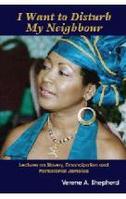
Title: I want to Disturb My Neighbour
Author: Verene A. Shepherd
Publisher: Ian Randle Publishers
Reviewer: Paul H. Williams
There is nothing riotous about I Want to Disturb My Neighbour. Well, not in an unlawful way. For it is a scholarly collection of 21 lectures and speeches on slavery, emancipation and postcolonial Jamaica, delivered locally and internationally, from 1998-2005 by Professor A. Shepherd, lecturer and renowned social historian at the University of the West Indies (UWI), Mona.
The papers are arranged thematically in five main sections: Historiography and Knowledge Production in Jamaica and the Wider Caribbean; Enslavement and Resistance; Emancipation and Migration - Negotiating Free Society; Slavery's legacy in Postcolonial Jamaica; and 'I Want to Disturb my Neighbour' - Activism in an Age of Individualism.
In the preface, Professor Shepherd says while "the primary responsibilities of the university academic are to teach and advise graduate and undergraduate students, attend to examination duties, conduct research and publish the findings of such research ... historians at the UWI are among those who refuse to imprison themselves within the walls of academia, becoming heavily involved in public service ... and delivering public lectures locally, regionally and internationally".
So, in keeping with that philosophy, she has been making the rounds on the lecture circuit and has amassed volumes of written work. The lectures and speeches were given on different occasions to specific audiences of various backgrounds, suasions and sensibilities. Some have been published before, but the main purpose for publishing this particular compilation was "to share these lectures with a wider audience, especially those unexposed to the history of the Caribbean and to undergraduates who will benefit from these summaries and interpretation".
Between its glossy covers, there is something for every one. Apart from the deep intellectual academic issues, the collection addresses topics that are still current and relevant. There is The Case for Reparation - Historical Basis, in which Shepherd outlines three bases for reparation: "That the Caribbean was a primordial site of slavery"; "That slavery in Jamaica took its toll on the enslaved population", and "That the trade in captives, and slavery were crimes against humanity (as defined by the Charter of the Nuremberg Tribunal) as recognised a century earlier by anti-slavery activists".
In I Want to Disturb My Neighbour (from which the compilation is named) and The Man at the Door - In an Age of Individualism, Shepherd tells the 2002 graduating class of Brown's Town Community College "to become activists in the Jamaican society and adopt as your motto, as Bob Marley has done, 'I want to disturb My Neighbour'. She said that motto "can simply be a metaphor for adopting an activist stance in the age of liberalism".
The performance of boys in the Jamaican education system, which is a very hot topic, is discussed, among other things, in Challenging Masculine Myths: Gender, History Education and Development in Jamaica. Professor Shepherd says, inter alia, "obviously, the mass media must share a large part of the responsibility for how young men see themselves; how they construct their self-identity and masculinity". That was in November 2002 at the Planning Institute of Jamaica Dialogue for Development Lecture at the Jamaica Pegasus hotel.
This lecture could have well been given yesterday, today or tomorrow. More issues of gender are dealt with in Sex in the Tropics (Sect I); Petticoat Rebellion, and Beside Every Successful Man (Sect II); My feet is {sic} my Only Carriage (Sect III); and, Dear Mrs Seacole (Sect IV).
The joy of I Want to Disturb My Neighbour is that the selections are quite dynamic in their treatment; they are reflective, penetrative, instructive, yet all are underscored by the analytic approach that Shepherd is known for. Quite a few are punctuated with humour, such as the letter, Dear Mrs Seacole, delivered at the Institute of Jamaica's function to honour Mary Seacole, 'doctoress' of international renown, on November 21, 2005, to mark the bicentenary of Seacole's birth.
The letter reads in part: "Now, a single black woman roaming all over the world like Digicel and Cable and Wireless, and carrying herbs would certainly have attracted attention including a body scan! As an attractive Jamaican woman, brown or not, you would perhaps, have been mistaken for a drug mule, sniffed by colour-prejudice dogs and have your ample body 'feel-feel' up by strange men and women."
Well, men and women - strange and not so strange - should go and get a copy of I Want to Disturb My Neighbour; it's a must-have, even for the front cover, which is actually a pretty portrait of the professor herself.

